Nowadays, website developers have one more detail to take into consideration when building a new site. Besides design, layout, and accessibility, they also have to pay attention to how the website will handle the personal information of its visitors.
To ensure that your website is available to as many internet users as possible, you must ensure that it complies with the General Data Protection Regulation (GDPR) and the California Consumer Privacy Act (CCPA).
These terms may be confusing to entry-level developers, which is why today’s focus is on GDPR vs. CCPA – their key differences and similarities. Our mission is to discover how you can go about to make sure that your website is protective of your visitors’ information whether they access it from Europe or California.
What is GDPR?
The General Data Protection Regulation (GDPR) is a law of the European Union that all of its 27 member states abide by when it comes to the protection of personal data on the internet.
The GDPR came into effect in May 2018, and since then, it regulates how websites, companies, and organizations handle personal data of their internet users.
The information that falls under the GDPR’s safeguard includes names, e-mail addresses, location data, and browser history among other details.
Regardless of where your website is located, once it receives visitors from the EU, you must first obtain prior consent from the user regarding their information. The form through which you ask for their consent has to be straightforward, and it must express transparently the purpose, extent, and duration of your data processing.
According to the EU Court of Justice (CJEU), the cookie consent banner on your website must have clear, un-checked boxes, which users may tick as they please according to how much of their data they want to share and the purpose for it.
The GDPR applies to all the websites in the world, regardless of their location, as long as they have visitors from the European Union.
What is CCPA?
California is the first state to adopt state-wide privacy legislation in the US through the California Consumer Privacy Act (CCPA), which came into effect on January 1, 2020.
The Golden State follows in the footsteps of the major changes done by GDPR to the use of personal information on the internet. Other states that acted similarly are Maine and Nevada, but which only passed new privacy legislation or amendments to existing law.
The CCPA differs from the GDPR by giving its users full power and responsibility to request businesses to disclose or delete the data they have already collected, or to opt-out completely of third-party data sales.
The CCPA applies to every company in the world if it collects personal data of California residents.
According to the local laws of California, any person who is in California for other than a temporary or transitory purpose or has their domicile within the state borders is a California resident. This definition is available whether they are accessing the internet from inside or outside California.
How to comply with the GDPR and the CCPA
Being compliant with the GDPR does not make your website compliant with the CCPA as well, and vice-versa. Some of the privacy policies may intersect, but you cannot ensure that you are respecting both laws by complying with just one of them.
The two sets of regulations differ fundamentally and they establish two distinct legal frameworks for privacy and data autonomy in the European Union and California respectively.
You can ensure that your website complies with both the GDPR and the CCPA by using Cookiebot.
This software-as-a-service tool is a cloud-driven mechanism that helps websites complies with GDPR legislation while ensuring that the personal data of your Californian visitors is collected and processed legally under the CCPA safeguard.
Cookiebot provides some of the best support features and tools out of all the cookie checkers out there. It comes with active consent, well-defined granularity, and the option to deny consent. It audits cookies every month and lets users know which of them are being used regularly.
